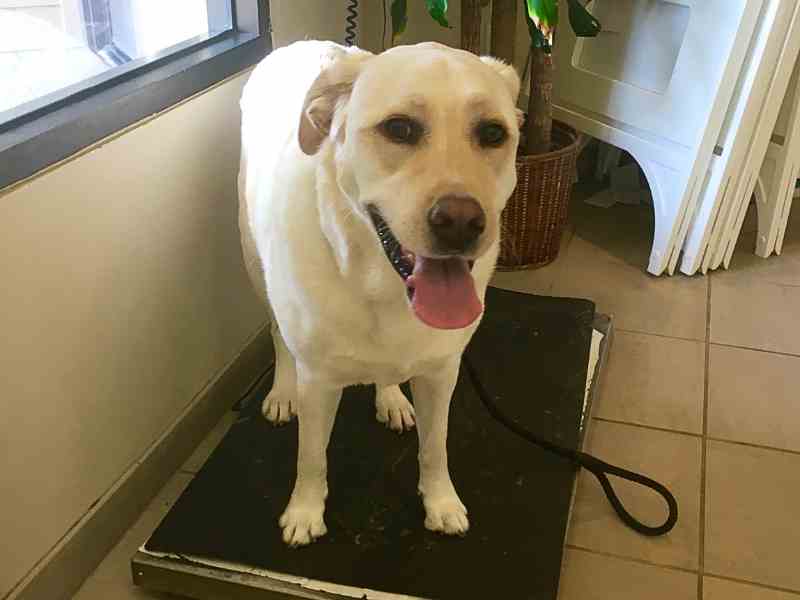Have you ever wondered why your dog always seems to want to eat? If you have a Labrador or Flat-Coated Retriever, you may owe them an apology for thinking they were just being greedy. Researchers from The University of Cambridge found a gene mutation that affects about a quarter of Labrador Retrievers and over half of Flat-Coated Retrievers. This genetic predisposition means they may be wired to feel insatiably hungry. The research also suggests that their bodies may simultaneously be wired to burn fewer calories, putting them at a higher risk of obesity.
The study, led by Dr. Eleanor Raffan at the University of Cambridge’s Department of Physiology, Development, and Neuroscience, looked at a gene mutation called POMC (pro‐opiomelanocortin), which plays a critical role in hunger and energy use. Around 25% of Labradors and 66% of Flat-Coated Retriever dogs have the POMC mutation, which researchers previously showed causes increased interest in food and risk of obesity.
Dr. Raffan’s team looked into how this genetic mutation doesn’t just increase the studied dogs’ appetites; it actually changed their entire relationship with food. Despite consuming a meal that would generally satisfy another dog, these genetically predisposed Labradors and Flat-Coated Retrievers may find themselves caught in a cycle of perpetual hunger where they’re eagerly awaiting their next opportunity to eat, only to also be wired to hold on to the caloric intake more than the average dog.
Dr. Raffan’s research highlights the struggle of these dogs, not just in their seemingly never-ending search for the next meal but also in their body’s inefficient energy use. The affected dogs use about 25% less energy at rest than their counterparts without the mutation. This inefficiency means they don’t require as many calories to maintain their weight, but their hunger signals push them to consume more, creating quite the challenge for helping them maintain a healthy weight.
This groundbreaking study explored the behavioral implications of the POMC mutation, like their increased efforts to access food (shown by the dogs’ determined attempts to retrieve a sausage from a securely closed box) and provides a compassionate perspective on pet obesity, particularly for these breeds. Dr. Raffan’s work sheds light on the physiological contexts of weight gain in dogs and offers insight to pet parents to move beyond simple notions of dog obesity as overfeeding or lack of exercise, and to understand the genetic factors at play.
Additionally, the study looked at the dogs’ energy expenditure through innovative methods, such as measuring the gasses they exhaled in a special chamber. This approach was to gauge their metabolic rate accurately and confirms the lower energy expenditure in dogs with the POMC mutation, which adds a critical piece to the puzzle of dog obesity.
This research can help deepen our understanding of genetic influences on behavior and metabolism in dogs and parallels similar conditions in humans. By exploring the role of the POMC gene and its pathway, the study opens doors to potential treatments for obesity and related disorders, extending its implications far beyond veterinary science.
Understanding that a significant number of Labradors and Flat-Coated Retrievers are genetically predisposed to feel hungrier and burn fewer calories gives us a new lens through which to view our approach to their care. It also emphasizes the importance of tailored dietary and exercise plans that take these genetic factors into account. Dr. Raffan believes that innovative feeding strategies, like using puzzle feeders or scattering food to prolong feeding times, are just the beginning of addressing this challenge.
In light of these findings, we need to remember that while managing our dog’s weight is important for everything from joint health to diabetes, we need to consider how to do so compassionately as well. It’s not just as easy as giving less food or even adding in more exercise if there’s a genetic component also at play.
Dogs with the POMC mutation may pave the way for us to continue to look out for how to improve the lives of countless dogs as we look at their unique genetic makeup when we’re trying to help them live their best lives.
Having large-breed dogs ourselves, we watch their weight constantly. We included ingredients science has found to help dogs maintain healthy weights. The fibers we included can help reduce hunger in dogs for several reasons:
- Increased Satiety (Feeling Full): Dietary fiber sources, such as Miscanthus grass, dried pumpkin, and flaxseed, have a high volume and are low in calories. When dogs eat them, they absorb water and expand in the stomach, which can help them feel fuller for longer.
- Digestion Regulation: Adding prebiotics like inulin and Xylooligosaccharides (XOS) fosters a healthy gut environment by feeding the beneficial bacteria in the dog’s gut. A healthy gut can contribute to better digestion and possibly a more regulated appetite.
- Slow Digestion: High-fiber foods take longer to digest, which slows down the release of glucose into the bloodstream and promotes a longer-lasting sensation of fullness.
- Energy Control: Fibers regulate the absorption of nutrients, which can prevent rapid spikes in blood sugar levels, leading to better energy management and potentially less hunger between meals.
Overall, premium fibers support a healthy dog digestive system. This is crucial for overall well-being and can also contribute to weight management in dogs by helping them feel full for longer periods. This isn’t just helpful for dogs with a predisposition to obesity, like those with the POMC mutation, but for all dogs needing weight management help, as feeling full may help them eat less and manage their weight more effectively.


